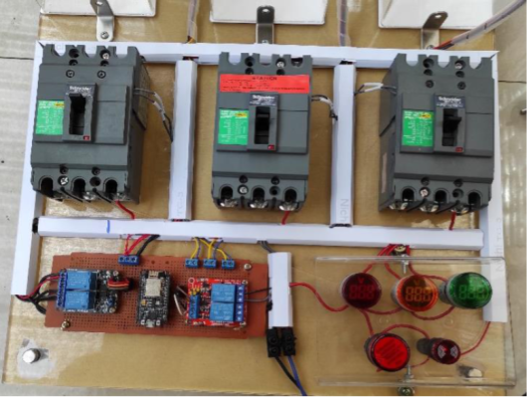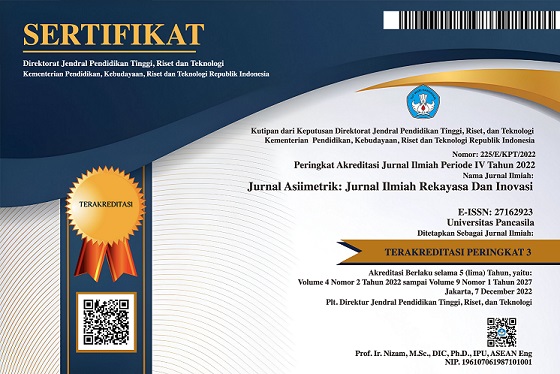IoT Based Remote Low Voltage Power Circuit Breaker System in Flood Areas
DOI:
https://doi.org/10.35814/asiimetrik.v6i2.6953Keywords:
MCCB, ESP 8266, blynk, water levelAbstract
In some housing complexes with traditional electrical installation systems, electrical substations are often located in the middle of the housing complex or an area affected by flooding, causing the substation to be submerged and potentially endangering flood victims from being electrocuted. Based on these conditions, a remote voltage breaker system is needed to cut the electricity off automatically when the water level has passed a set point. This remote low-voltage electricity breaker system in flood areas is a tool for disconnecting the electrical system by detecting the water level. It can be monitored remotely based on IoT using an Android-based application. Using the HCSR04 Ultrasonic sensor to detect the water level in each container with a reading distance ranging from 2 cm to 450 cm, Ultrasonic sensor measurements will determine whether the detected water level is dangerous or not if the condition is dangerous, namely the detected water level is higher than the set point. Then, the MCCB will trip automatically. A microcontroller will process data and display the water level on the smartphone using the Blynk application. This tool uses a Node MCU-type microcontroller equipped with an ESP8266 WiFi module that functions as a regulator of the components used. The Blynk application will display water level monitoring data detected by the ultrasonic sensor in centimetre units. In the Blynk application, there is also a widget button that triggers the MCCB manually remotely. Several tests carried out on ultrasonic sensors produce the lowest error value of 1.49%, and the maximum trip time is 2.07 seconds.
Downloads
References
Bunga, P., Pakiding, M. and Silimang, S. (2015) ‘Perancangan Sistem Pengendalian Beban Dari Jarak Jauh Menggunakan Smart Relay’, Jurnal Teknik Elektro dan Komputer, 4(5), pp. 65–75.
Darwis, M. et al. (2023) ‘IoT Based Early Flood Detection System with Arduino and Ultrasonic Sensors in Flood-Prone Areas’, JURNAL TEKNIK INFORMATIKA, 16(2), pp. 133–140.
Hirzan, M.F. (2022) Monitoring Pemutus Aliran Listrik Sistem Tegangan Rendah Berbasis Internet Of Things (Iot) Pada Daerah Banjir. Tugas Akhir. Politeknik Negeri Jakarta. Available at: https://repository.pnj.ac.id/id/eprint/7623/ (Accessed: 10 May 2024).
Ishwar, A.M. et al. (2016) ‘Microcontroller Based Electronic Circuit Breaker’, International Research Journal of Engineering and Technology (IRJET), 3(4), pp. 569–571.
Kastanja, A.J., Laisina, L. and Pelamonia, C.E.O. (2022) ‘Rancang Bangun Sistem Monitoring Arus Dan Tegangan Listrik Pada Instalasi Rumah Tinggal Berbasis Mikrokontroler’, JURNAL SIMETRIK, 12(2), pp. 606–612.
Khan, G.M.A. (2022) Pemrograman Prototipe Pengendali MCCB Dan MCB PHB-TR Pada Simulasi Banjir Berbasis Internet Of Things (IoT). Tugas Akhir. Politeknik Negeri Jakarta. Available at: https://repository.pnj.ac.id/id/eprint/7535/ (Accessed: 1 May 2024).
Kulkarni, A.D. et al. (2022) ‘Design of Microcontroller based Moulded Case Circuit Breaker (MCCB) with Electronic Trip Unit’, in Proceedings of National Power Systems Conference (NPSC) 2002. National Power Systems Conference (NPSC) 2002, Kharagpur, India: Indian Institute Of Technology, pp. 267–269.
Muhammad, F. and Endah, F. (2020) Rancang Bangun Pemutus Arus Pada Stop Kontak Dan Saklar Pada Saat Banjir Berbasis Mikrokontroler. Tugas Akhir. Universitas Bina Darma. Available at: http://repository.binadarma.ac.id/1642/ (Accessed: 2 July 2024).
Nurhakim, F.B.D., Suhanto and Sunaryo (2019) ‘Rancang Bangun Sistem Kontrol Dan Monitoring Proteksi Mccb Motorized Berbasis Supervisor Controland Data Acquistion’, Prosiding SNITP (Seminar Nasional Inovasi Teknologi Penerbangan), 3(1), pp.1-7.
Sadi, S. (2018) ‘Rancang Bangun Monitoring Ketinggian Air Dan Sistem Kontrol Pada Pintu Air Berbasis Arduino Dan SMS Gateway’, Jurnal Teknik, 7(1), pp. 77–91.
Shaputra, R., Gunoto, P. and Irsyam, M. (2019) ‘Kran Air Otomatis Pada Tempat Berwudhu Menggunakan Sensor Ultrasonik Berbasis Arduino Uno’, SIGMA TEKNIKA, 2(2), pp. 192–201.
Syafar, A.M. (2016) ‘Kendali Perangkat Listrik dan Monitoring Daya pada MCB Berbasis TCP/IP’, Jurnal INSTEK (Informatika Sains dan Teknologi), 1(1), pp. 11–20.
Syukhron, I. (2021) ‘Penggunaan Aplikasi Blynk untuk Sistem Monitoring dan Kontrol Jarak Jauh pada Sistem Kompos Pintar berbasis IoT’, Electrician : Jurnal Rekayasa dan Teknologi Elektro, 15(1), pp. 1–11.
Widiantoko, A. and Nugroho, B. (2019) ‘Implementasi Sistem Cerdas Pengontrol Dan Monitoring MCB Panel Listrik PLN Secara Terpusat Pada Laboratorium IIB Darmajaya’, Jurnal Informatika, 19(2), pp. 136–143.
Windiastik, S.P., Ardhana, E.N. and Triono, J. (2019) ‘Perancangan Sistem Pendeteksi Banjir Berbasis Iot (Internet of Thing)’, in Prosiding Seminar Nasional Sistem Informasi (SENASIF). Seminar Nasional Sistem Informasi (SENASIF), Malang, Indonesia: Fakultas Teknologi Informasi Universitas Merdeka Malang, pp. 1925–1931.
Yusuf, M.H. (2023) ‘Sistem Monitoring Ketinggian Air Dan Pemutus Arus Pada Bangunan Rumah Rawan Banjir Menggunakan Wireless Sensor Network (WSN) dan Web GIS’, Jurnal Informatika Ilmu Komputer dan Sistem Informasi, 1(1), pp. 1–7.
Zahir, S.B. et al. (2019) ‘Smart IoT Flood Monitoring System’, in Journal of Physics: Conference Series. International Conference Computer Science and Engineering (IC2SE), Padang, Indonesia: Universitas Putra Indonesia ‘YPTK’ Padang, p. 012043.
Zakaria, W.A.J.M.I. (2021) ‘Flood Monitoring And Warning Systems: A Brief Review’, Journal of Southwest Jiaotong University, 56(3), pp. 1–10.
Zidan, M.H. (2022) Rancang Bangun Pemutus Aliran Listrik Sistem Tegangan Rendah Berbasis IoT Pada Daerah Banjir. Tugas Akhir. Politeknik Negeri Jakarta. Available at: https://repository.pnj.ac.id/id/eprint/7562/ (Accessed: 12 June 2024).





























